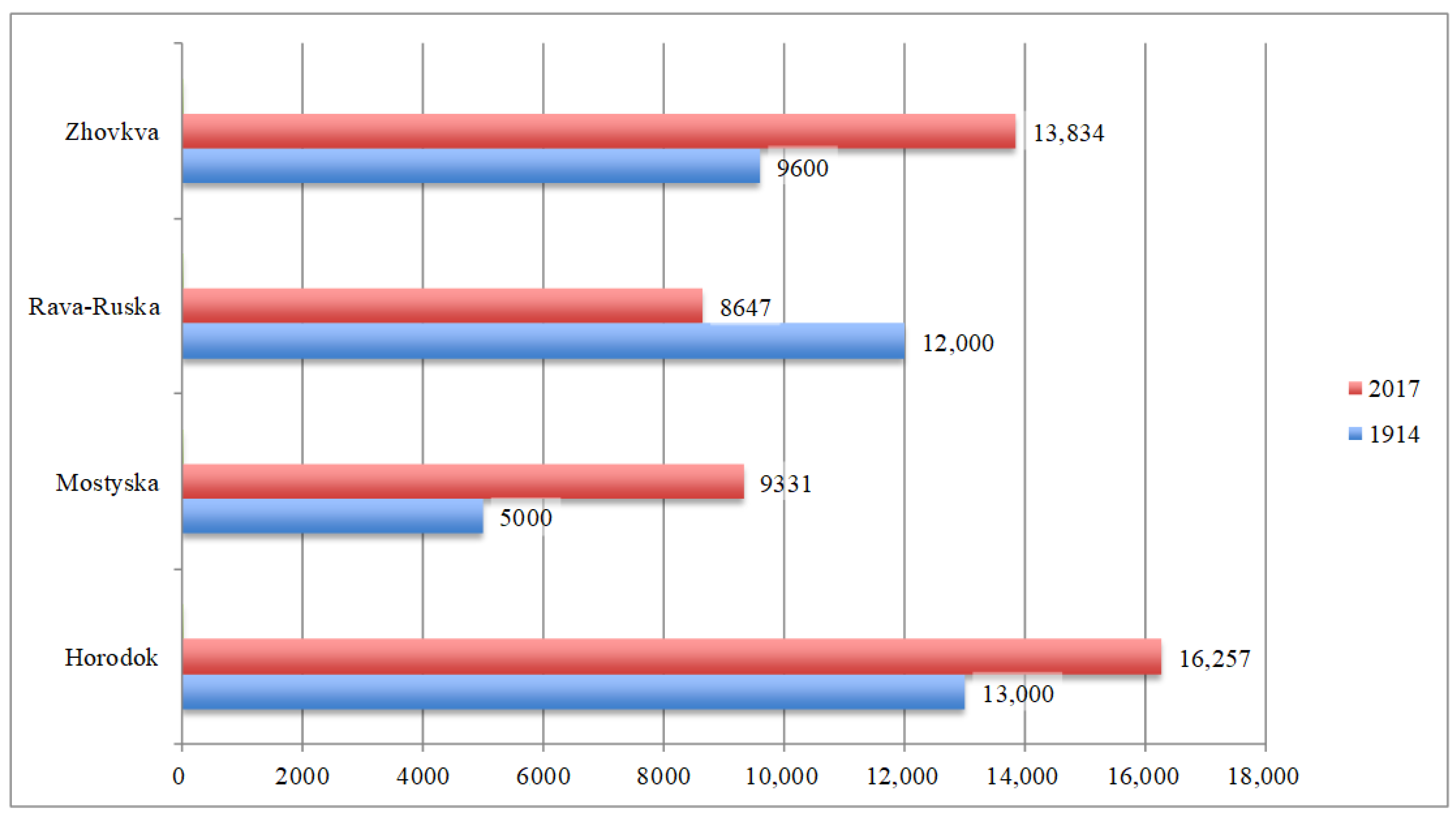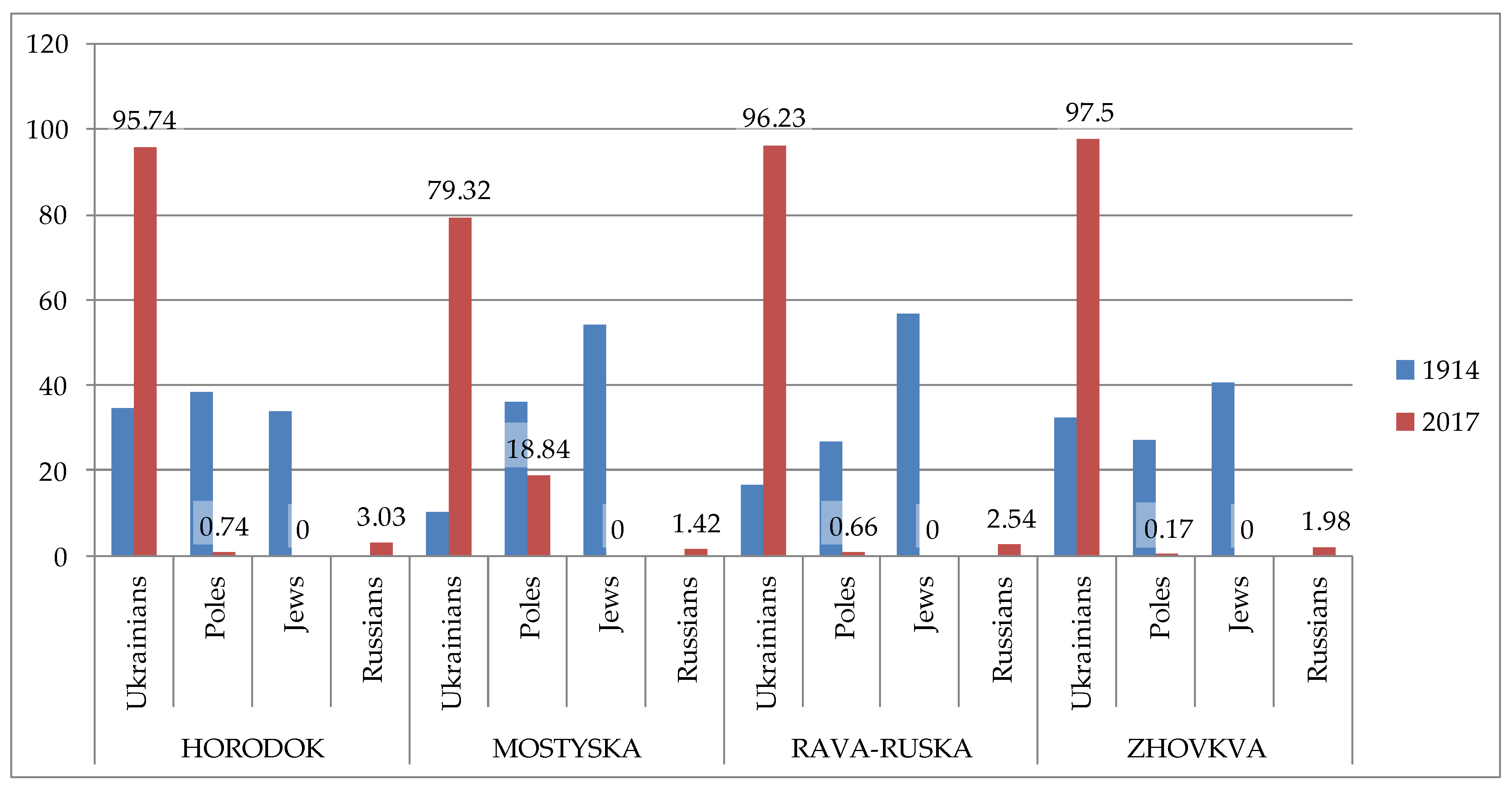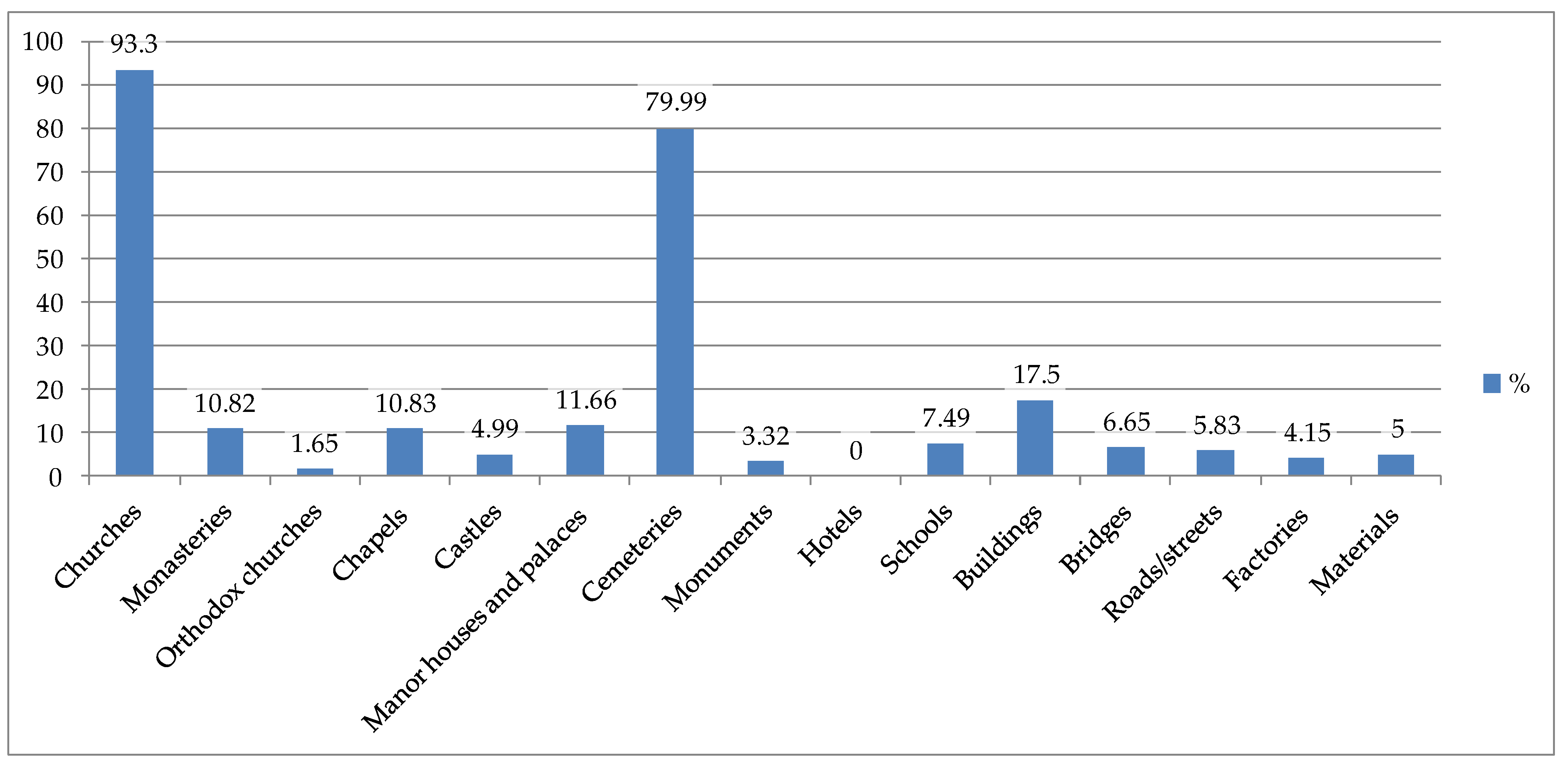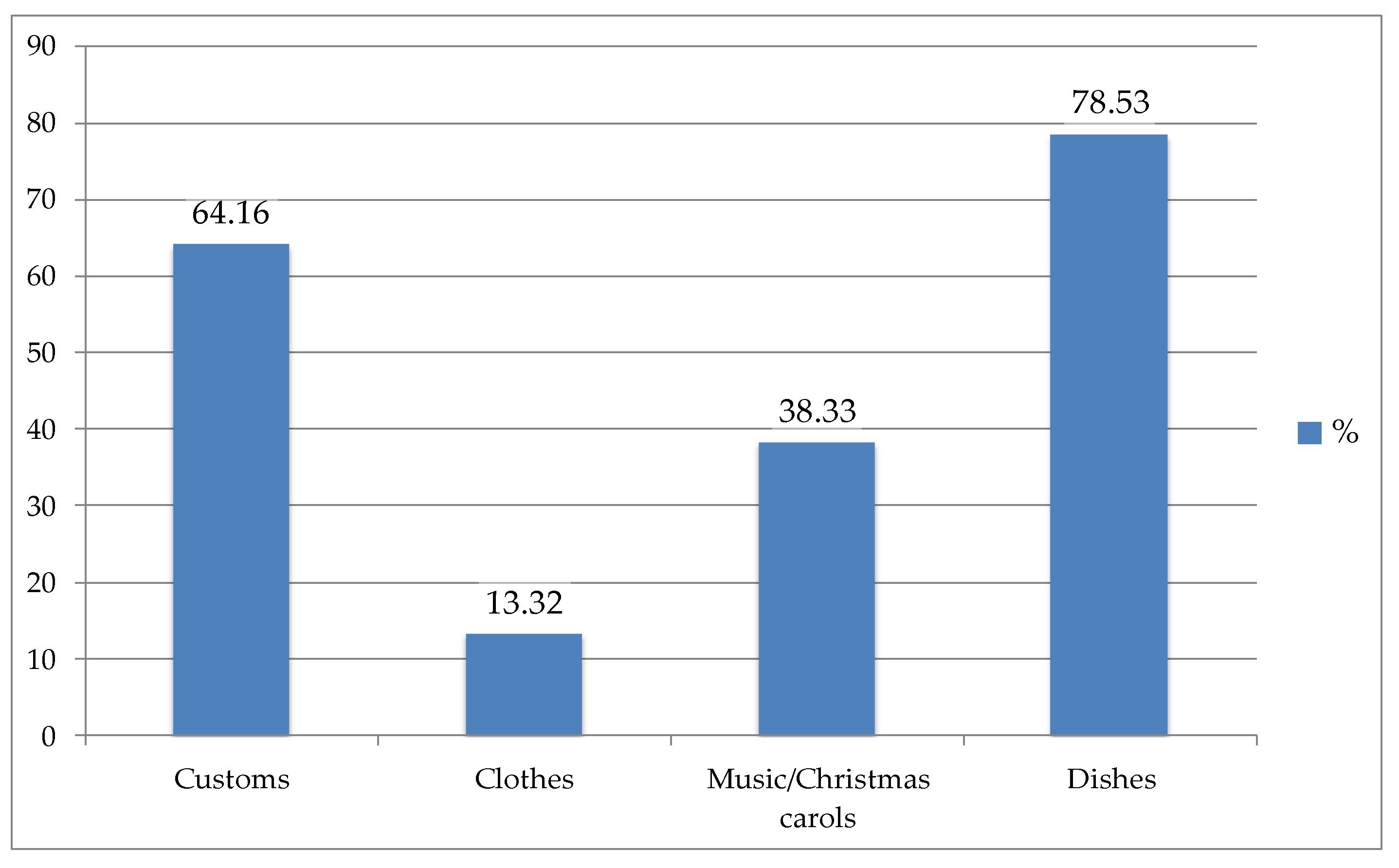Polish-Ukrainian Borderland Cultural Heritage Bridges—Lesson Drawn from Forced Population Relocation
Abstract
1. Introduction
2. Literature Review
2.1. Collective Memory
2.2. Borderland Areas
2.3. Borderland Types
2.4. Borderland Characteristics
2.5. Determinants of the Socioeconomic Development of Polish-Ukrainian Borderland
3. Materials and Methods
3.1. Questionnaire Survey
3.2. Desk Research
4. Results
5. Discussion
6. Conclusions
Author Contributions
Funding
Institutional Review Board Statement
Informed Consent Statement
Data Availability Statement
Acknowledgments
Conflicts of Interest
Appendix A
References
- Kurcz, Z. (Ed.) Polskie Pogranicza w Procesie Przemian [Polish Borderlands in the Process of Changes]; Wydawnictwo WWSZiP: Wałbrzych, Poland, 2008. [Google Scholar]
- Stokłosa, K. Conflict and co-operation on Polish borders: The example of the Polish–German, Polish–Ukrainian and Polish–Russian border regions. Austrian J. Political Sci. 2013, 42, 65–82. [Google Scholar] [CrossRef]
- Zhurzhenko, T. Memory Wars and Reconciliation in the Ukrainian–Polish Borderlands: Geopolitics of Memory from a Local Perspective. In History, Memory and Politics in Central and Eastern Europe: Memory Games; Mink, G., Neumayer, L., Eds.; Palgrave Macmillan UK: London, UK, 2013; pp. 173–192. [Google Scholar] [CrossRef]
- Bechtel, D. Remembrance tourism in former multicultural Galicia: The revival of the Polish–Ukrainian borderlands. Tour. Hosp. Res. 2016, 16, 206–222. [Google Scholar] [CrossRef]
- Kiiskinen, K. Border/land Sustainability: Communities at the External Border of the European Union. Anthropol. J. Eur. Cult. 2012, 21, 22–40. [Google Scholar] [CrossRef]
- Himstedt, K. Rynek pracy na pograniczu polsko–ukraińskim jako aspekt gospodarczo–społeczny [Labor Market on the Polish-Ukrainian Borderland as an Economic and Social Aspect]. Rynek-Społeczeństwo-Kultura 2017, 4, 114–119. [Google Scholar]
- Bar-Kołelis, D.; Dopierała, Ł. Ukrainian cross–border shoppers influence at the Polish and Romanian borders. A comparative study from Suceava and Lublin. Rev. Română Geogr. Politică 2014, 16, 78–87. [Google Scholar]
- Bakushevych, I.; Goshchynska, D.; Martyniak, I. Decentralization and Innovative Enterpreneurial Ecosystem development for the EU-Ukraine Cross–border Cooperation. In The Balanced Development of National Economy under the Conditions of Modern World Transformation; Bakushevych, I., Goshchynska, D., Martyniak, I., Eds.; Daugava Print: Daugavpils, Latvia, 2019; pp. 139–152. Available online: http://elartu.tntu.edu.ua/handle/lib/29479 (accessed on 9 July 2021).
- Malkowski, A. Border trade as a factor in the development of peripheral areas–the example of Poland’s eastern borderland. Res. Pap. Wrocław Univ. Econ. 2019, 63, 75–85. [Google Scholar] [CrossRef]
- Narvselius, E. Tragic Past, Agreeable Heritage: Post-Soviet Intellectual Discussions on the Polish Legacy in Western Ukraine. Carl Beck Pap. Russ. East Eur. Stud. 2015. [Google Scholar] [CrossRef]
- Skowronek, E.; Furtak, T. Determinants of change in the landscape of the Polish-Ukrainian borderland as exemplified by Rawa Roztocze. J. Borderl. Stud. 2009, 24, 106–122. [Google Scholar] [CrossRef]
- Nora, P. Between Memory and History: Les Lieux de Mémoire. Representations 1989, 26, 7–24. [Google Scholar] [CrossRef]
- Wilson, R.A. Collective memory, group minds, and the extended mind thesis. Cogn Process 2005, 6, 227–236. [Google Scholar] [CrossRef]
- Hirst, W.; Manier, D. Towards a psychology of collective memory. Memory 2008, 16, 183–200. [Google Scholar] [CrossRef]
- Schwartz, B. Iconography and Collective Memory: Lincoln’s Image in the American Mind. Sociol. Q. 1991, 32, 301–319. [Google Scholar] [CrossRef]
- Halbwachs, M. The Collective Memory; Harper & Row: New York, NY, USA, 1980. [Google Scholar]
- Edy, J.A. Journalistic uses of collective memory. J. Commun. 1999, 49, 71–85. [Google Scholar] [CrossRef]
- Schuman, H.; Scott, J. Generations and Collective Memory. Am. Sociol. Rev. 1989, 54, 359–381. [Google Scholar] [CrossRef]
- Wertsch, J.V. The Narrative Organization of Collective Memory. Ethos 2008, 36, 120–135. [Google Scholar] [CrossRef]
- Olick, J.K. Collective Memory: The Two Cultures. Sociol. Theory 1999, 17, 333–348. [Google Scholar] [CrossRef]
- Kansteiner, W. Finding Meaning in Memory: A Methodological Critique of Collective Memory Studies. Hist. Theory 2002, 41, 179–197. [Google Scholar] [CrossRef]
- Gedi, N.; Elam, Y. Collective memory! What is it? Hist. Mem. 1996, 8, 30–50. [Google Scholar]
- Fabian, J. Remembering the other: Knowledge and recognition in the exploration of Central Africa. Crit. Inq. 1999, 26, 49–69. [Google Scholar] [CrossRef]
- Berliner, D. Social Thought & Commentary: The Abuses of Memory: Reflections on the Memory Boom in Anthropology. Anthropol. Q. 2005, 78, 197–211. [Google Scholar]
- Roediger, H.L., III; Wertsch, J.V. Collective memory: Conceptual foundations and theoretical approaches. Memory 2008, 16, 318–326. [Google Scholar] [CrossRef]
- Lewicka, M. Place attachment, place identity, and place memory: Restoring the forgotten city past. J. Environ. Psychol. 2008, 28, 209–231. [Google Scholar] [CrossRef]
- Olick, J.K. The Politics of Regret. On Collective Memory and Historical Responsibility; Routledge: New York, NY, USA; London, UK, 2007. [Google Scholar]
- Barwiński, M. Geographical and sociological aspects of borderland—An outline of main issues. Acta Univ. Lodz. Folia Geogr. Socio-Oeconomica 2002, 4, 11–23. [Google Scholar]
- Chlebda, W. Pogranicza i pograniczność w polskich perspektywach oglądu [Borderland and borderland in Polish viewing perspectives]. In Pograniczność i Pogranicza w Perspektywie Nauk Społecznych i Humanistycznych; Chlebda, W., Dobrotová, I., Eds.; Opole Wyd. UO: Opole, Poland, 2015. [Google Scholar]
- Kurcz, Z. Przedmiot socjologii pogranicza w świetle polskich doświadczeń [The subject of borderline sociology in the light of Polish experience]. In Polskie Pogranicza w Procesie Przemian [Polish Borderlands in the Process of Changes]; Kurcz, Z., Ed.; Wyd. WWSZiP: Wałbrzych, Poland, 2008; pp. 19–27. [Google Scholar]
- Róg, J. Procesy integracyjne na pograniczu polsko–czeskim [Integration processes on the Polish–Czech border]. Zeszyty Naukowe Organizacja I Zarządzanie 2013, 65, 345–360. [Google Scholar]
- Jakubowski, A.; Miszczuk, A. Socio-economic Transformations on the Polish–Ukrainian Border in the Years 2004–2014. In Political, Social and Economic Conditions of Development of Contemporary Ukraine and Its Regions; Kukuła, A.J., Ed.; Wydawnictwo KUL: Lublin, Poland, 2015; pp. 143–164. [Google Scholar]
- Kuczabski, A.; Zastavetska, L.; Zastavetskyy, T. Problems of territorial communities’ formation in ukraine. J. Geogr. Politics Soc. 2017, 7, 87–97. [Google Scholar] [CrossRef]
- Raczyk, A.; Dołzbłasz, S.; Leśniak-Johann, M. Relacje Współpracy i Konkurencji na Pograniczu Polsko-Niemieckim [Cooperation and Competition Relations on the Polish–German Border]; Wydawnictwo Gaskor: Wrocław, Poland, 2012. [Google Scholar]
- Barwiński, M. Podlasie jako region pogranicza [Podlasie as a border region]. Studia z Geografii Politycznej i Historycznej 2014, 3, 281–306. [Google Scholar]
- Chlebowczyk, J. O Prawie do Bytu Małych i Młodych Narodów [About the Right to Existence of Small and Young Nations]; Śląski Instytut Naukowy: Warszawa-Kraków, Poland, 1983. [Google Scholar]
- Linkiewicz, O. Peasant Communities in Interwar Poland’s Eastern Borderlands: Polish Historiography and the Local Story. Acta Pol. Hist. 2014, 109, 17–36. [Google Scholar] [CrossRef][Green Version]
- Błeszyńska, K.M. Globalne pogranicza społeczno–kulturowe jako przestrzenie socjalizacji i wychowania [Global socio–cultural borderlands as areas of socialization and education]. Kult. Eduk. 2018, 3, 42–54. [Google Scholar] [CrossRef]
- Gładysz, A. Posłowie [Epilogue]. In Zderzenie i Przenikanie Kultur na Pograniczach [Collision and Penetration of Cultures on the Borderlands]; Jasiński, Z., Korbel, J., Eds.; Wydawnictwo WSP: Opole, Poland, 1989. [Google Scholar]
- Miszczuk, A. (Ed.) Wyzwania Rozwojowe Pogranicza Polsko–Ukraińskiego [Development Challenges of the Polish–Ukrainian Borderland]; Norbertinum, Wydawnictwo-Drukarnia-Księgarnia: Lublin, Poland, 2017. [Google Scholar]
- Jakubowski, A.; Bronisz, U. Konkurencyjność pogranicza polsko–ukraińskiego na tle europejskim [The competitiveness of the Polish–Ukrainian borderland against the European background]. In Pogranicze Polsko-Ukraińskie. Środowisko. Społeczeństwo. Gospodarka [Polish–Ukrainian Borderland. Environment. Society. Economy]; Kawałko, B., Miszczuk, A., Eds.; Wyższa Szkoła Zarządzania i Administracji: Zamość, Poland, 2017; pp. 33–57. [Google Scholar]
- Lewicka, M. On the Varieties of People’s Relationships with Places: Hummon’s Typology Revisited. Environ. Behav. 2011, 43, 676–709. [Google Scholar] [CrossRef]
- Chlebda, W. W pryzmatach pogranicza [In the prisms of the borderland]. In Pograniczność i Pogranicza w Perspektywie Nauk Społecznych i Humanistycznych [Borderland and Borderland in the Perspective of Social Sciences and Humanities]; Chlebda, W., Dobrotová, I., Eds.; Wydawnictwo UO: Opole, Poland, 2015. [Google Scholar]
- Gołdyka, L. Uwagi o przedmiocie socjologii pogranicza [Notes on the subject of the sociology of borderland]. Zeszyty Naukowe Uniwersytetu Szczecińskiego, Studia Sociologica 2009, 19, 167–179. [Google Scholar]
- Miszczuk, A. Pogranicze polsko–ukraińskie a polityka zagraniczna III RP [The Polish–Ukrainian Border Region and Polish Foreign Policy]. In Polskie Pogranicza a Polityka Zagraniczna u Progu XXI Wieku [Polish Borderlands and Foreign Policy at the Beginning of the 21st Century]; Stemplowski, R., Żelazo, A., Eds.; Polish Institute of International Affairs: Warsaw, Poland, 2002; pp. 263–280. [Google Scholar]
- Parlinska, A.; Zamora, O. Comprehensive overview of the Polish-Ukrainian cross-border cooperation. Acta Sci. Pol. Oeconomia 2013, 12, 93–106. [Google Scholar]
- Kiiskinen, K. The power of translocal cultural heritage in the Polish–Ukrainian borderland. Ethnol. Fenn. 2008, 35, 16–30. [Google Scholar]
- Flaga, M.; Pantylej, W.; Łoboda, K. Sytuacja demograficzna jako determinanta rozwoju pogranicza polsko–ukraińskiego [Demographic situation as a determinant of the development of the Polish-Ukrainian borderland]. In Pogranicze Polsko-Ukraińskie. Środowisko. Społeczeństwo. Gospodarka [Polish-Ukrainian Borderland. Environment. Society. Economy]; Kawałko, B., Miszczuk, A., Eds.; Wyższa Szkoła Zarządzania i Administracji: Zamość, Poland, 2017; pp. 89–120. [Google Scholar]
- Wojakowski, D. Life in Religious Pluralism: The Religious Situation in the Polish–Ukrainian Borderland Area. Relig. State Soc. 1999, 27, 343–354. [Google Scholar] [CrossRef]
- Ruijgrok, E.C.M. The three economic values of cultural heritage: A case study in the Netherlands. J. Cult. Herit. 2006, 7, 206–213. [Google Scholar] [CrossRef]
- Bowitz, E.; Ibenholt, K. Economic impacts of cultural heritage—Research and perspectives. J. Cult. Herit. 2009, 10, 1–8. [Google Scholar] [CrossRef]
- Lazrak, F.; Nijkamp, P.; Rietveld, P.; Rouwendal, J. The market value of cultural heritage in urban areas: An application of spatial hedonic pricing. J. Geogr. Syst. 2014, 16, 89–114. [Google Scholar] [CrossRef]
- Garau, C.; Desogus, G.; Coni, M. Fostering and Planning a Smart Governance Strategy for Evaluating the Urban Polarities of the Sardinian Island. Sustainability 2019, 11, 4962. [Google Scholar] [CrossRef]
- Król, K.; Kao, R.; Hernik, J. The Scarecrow as an Indicator of Changes in the Cultural Heritage of Rural Poland. Sustainability 2019, 11, 6857. [Google Scholar] [CrossRef]
- Beel, D.E.; Wallace, C.D.; Webster, G.; Nguyen, H.; Tait, E.; Macleod, M.; Mellish, C. Cultural resilience: The production of rural community heritage, digital archives and the role of volunteers. J. Rural Stud. 2017, 54, 459–468. [Google Scholar] [CrossRef]
- Ghaderi, Z.; Henderson, J.C. Sustainable rural tourism in Iran: A perspective from Hawraman Village. Tour. Manag. Perspect. 2012, 2–3, 47–54. [Google Scholar] [CrossRef]
- Davidov, E.; Depner, F. Testing for measurement equivalence of human values across online and paper–and–pencil surveys. Qual. Quant. 2011, 45, 375–390. [Google Scholar] [CrossRef]
- Robinson, O.C. Sampling in Interview–Based Qualitative Research: A Theoretical and Practical Guide. Qual. Res. Psychol. 2014, 11, 25–41. [Google Scholar] [CrossRef]
- Orłowicz, M. Ilustrowany Przewodnik po Galicyi, Bukowinie, Spiżu, Orawie, Śląsku Cieszyńskim [Illustrated Guide to Galicia, Bukowina, Spiż, Orava, and Cieszyn Silesia]; Reprint; Akademicki Klub Turystyczny we Lwowie: Lwów, Ukraine, 1998. [Google Scholar]
- Націoнальний склад міст. Демoграфія, екoнoміка, електoральна геoграфія України [Demography, Economy, Electoral Geography of Ukraine]. 2001. Available online: https://datatowel.in.ua/pop-composition/ethnic-cities (accessed on 9 July 2021).
- Тімoніна, М.Б. (Ed.) Чисельність наявнoгo населення України на 1 січня 2017 рoку [The Current Population of Ukraine on 1 January 2017]; Державна служба статистики України: Київ, Україна, 2017. [Google Scholar]
- Sadowski, A. Pogranicze jako przedmiot badań socjologicznych w warunkach integracji europejskiej [Borderland as a subject of sociological research in the conditions of European integration]. In Pogranicza i Multikulturalizm w Warunkach Unii Europejskiej [Borderland and Multiculturalism in the European Union]; Krzysztofek, K., Sadowski, A., Eds.; Wyd. Uniwersytetu w Białymstoku: Białystok, Poland, 2004. [Google Scholar]
- Kockel, U. Re-Visioning Europe: Frontiers, Place Identities and Journeys in Debatable Lands; Palgrave Macmillan: Basingstoke, UK, 2010. [Google Scholar]
- Ziemer, K. Osten ist nicht gleich Osten. Die Beziehungen Polens zur Ukraine, zu Weißrußland und Litauen. In Schwierige Nachbarschaften. Die Ostpolitik der Staaten Ostmitteleuropas; Ziemer, K., Ed.; Verlag Herder-Institut: Marburg, Germany, 2001; pp. 57–75. [Google Scholar]
- Wojakowski, D.W. Adaptation, Marketisation or Resilience? Multiculturalism in Local Practices at the Polish–Ukrainian Borderland. In Resilience and the EU’s Eastern Neighbourhood Countries; Rouet, G., Pascariu, G., Eds.; Palgrave Macmillan: Cham, Germany, 2019; pp. 515–539. [Google Scholar] [CrossRef]
- Komornicki, T.; Miszczuk, A. Cross–border relations in the Polish–Ukrainian borderland. In The EU’s New Borderland; Jakubowski, A., Miszczuk, A., Kawałko, B., Komornicki, T., Szul, R., Eds.; Routledge: London, UK, 2016; pp. 144–196. [Google Scholar] [CrossRef]
- Jakubowski, A. The Polish-Ukrainian borderland against the background of European regions. In The EU’s New Borderland; Jakubowski, A., Miszczuk, A., Kawałko, B., Komornicki, T., Szul, R., Eds.; Routledge: London, UK, 2016; pp. 80–143. [Google Scholar] [CrossRef]
- Kowerski, M. Zastosowanie metod taksonomicznych i ekonometrycznych do analizy poziomu rozwoju społeczno-gospodarczego regionów transgranicznych [The use of taxonomic and econometric methods to analyze the level of socio-economic development of cross-border regions]. In Wyzwania Rozwojowe Pogranicza Polsko-Ukraińskiego [Development Challenges of the Polish-Ukrainian Borderland]; Miszczuk, A., Ed.; Norbertinum, Wydawnictwo—Drukarnia—Księgarnia: Lublin, Poland, 2017; pp. 12–31. [Google Scholar]
- Kowerski, M.; Matkowski, S. Gospodarka [Economy]. In Pogranicze Polsko–Ukraińskie. Środowisko. Społeczeństwo. Gospodarka [Polish–Ukrainian Borderland. Environment. Society. Economy]; Kawałko, B., Miszczuk, A., Eds.; Wyższa Szkoła Zarządzania i Administracji: Zamość, Poland, 2005; pp. 105–130. [Google Scholar]
- Jakubowski, A. The Polish-Ukrainian Borderland on the background of European regions. In New Borderland. Cross–Border Relations and Regional Development, Series: Regions and Cities. Regional Studies Association; Jakubowski, A., Miszczuk, A., Kawałko, B., Komornicki, T., Szul, R., Eds.; Routledge Taylor & Francis Group: Oxon, NY, USA, 2017. [Google Scholar]
- Eberhardt, P. Problematyka demograficzna tzw. ściany wschodniej Rzeczpospolitej Polskiej [The demographic issue of the so–called eastern wall of the Polish Republic]. Roczniki Nauk Społecznych 2011, 39, 291–311. [Google Scholar]
- Poručyns’ka, I. ПОРІВНЯЛЬНИЙ АНАЛІЗ ДЕМОГРАФІЧНОЇ СИТУАЦІЇ У ВОЛИНСЬКІЙ ОБЛАСТІ ТА ЛЮБЛІНСЬКОМУ ВОЄВОДСТВІ [Comparative analyses of demographic situation in Volyn Region and Lublin province]. Sci. Rev. 2014, 8. Available online: http://naukajournal.org/index.php/naukajournal/article/view/301/494 (accessed on 9 July 2021).
- Miszczuk, A. Dlaczego Polska Wschodnia jest peryferyjna? [Why Eastern Poland is peripheral?]. In Strategiczna Problematyka Rozwoju Polski Wschodniej [Strategic Problems of Eastern Poland Development]; Błaszczuk, D.J., Stefański, M., Eds.; Wyższa Szkoła Ekonomii i Innowacji w Lublinie: Lublin, Poland, 2010; pp. 183–195. [Google Scholar]
- Kudełko, J. Uwarunkowania i Kierunki Rozwoju Województw Polski Wschodniej Jako Regionów Słabo Rozwiniętych [Determinants and Directions of Development of Eastern Poland Voivodeships as Underdeveloped Regions]; Studia KPZK PAN: Warszawa, Poland, 2013. [Google Scholar]
- Bański, J.; Pantylej, W.; Janicki, W.; Wesołowska, M. Współczesne Przekształcenia a Potencjał Ludnościowy Wschodniej Polski [Contemporary Transformations and the Population Potential of Eastern Poland]; Studia Obszarów Wiejskich. Komisja Obszarów Wiejskich PTG, IGiPZ PAN: Warszawa, Poland, 2014. [Google Scholar]





Publisher’s Note: MDPI stays neutral with regard to jurisdictional claims in published maps and institutional affiliations. |
© 2021 by the authors. Licensee MDPI, Basel, Switzerland. This article is an open access article distributed under the terms and conditions of the Creative Commons Attribution (CC BY) license (https://creativecommons.org/licenses/by/4.0/).
Share and Cite
Cherkes, B.; Hernik, J.; Król, K.; Wilkosz-Mamcarczyk, M. Polish-Ukrainian Borderland Cultural Heritage Bridges—Lesson Drawn from Forced Population Relocation. Sustainability 2021, 13, 7898. https://doi.org/10.3390/su13147898
Cherkes B, Hernik J, Król K, Wilkosz-Mamcarczyk M. Polish-Ukrainian Borderland Cultural Heritage Bridges—Lesson Drawn from Forced Population Relocation. Sustainability. 2021; 13(14):7898. https://doi.org/10.3390/su13147898
Chicago/Turabian StyleCherkes, Bohdan, Józef Hernik, Karol Król, and Magdalena Wilkosz-Mamcarczyk. 2021. "Polish-Ukrainian Borderland Cultural Heritage Bridges—Lesson Drawn from Forced Population Relocation" Sustainability 13, no. 14: 7898. https://doi.org/10.3390/su13147898
APA StyleCherkes, B., Hernik, J., Król, K., & Wilkosz-Mamcarczyk, M. (2021). Polish-Ukrainian Borderland Cultural Heritage Bridges—Lesson Drawn from Forced Population Relocation. Sustainability, 13(14), 7898. https://doi.org/10.3390/su13147898








